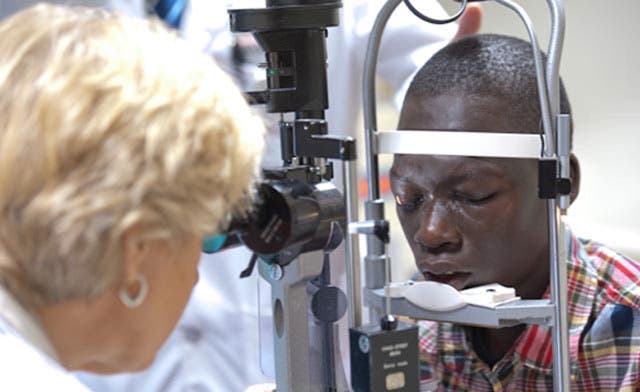Former captive stresses plight of Sudan’s slaves
A former Sudanese slave blinded by a cruel master pleaded for help Tuesday in throwing the spotlight on the plight of others like him, and to find his missing mother.
Ker Aleu Deng was a victim of the 22-year civil war between Sudan’s northern and southern regions that ended in 2005 after claiming two million lives and displacing four million people.
Taken during the war to the Muslim north from his home in the Christian and animist south by government-backed Arab militias after his father died, Deng was forced to look after goats and pick hibiscus tea leaves for his owner, who he said beat him regularly. His mother was made into the master’s sex slave.
The former master, known as Zakaria Salih, “would take out all his anger on us,” Deng told reporters at the U.S. Congress after being brought to the United States for restorative eyesight surgery.
“I was treated worse than the animals I slept with. Like them, I was property,” he later told lawmakers at a House Foreign Affairs Committee panel hearing on U.S. policy toward Sudan.
“But the animals weren’t beaten every day. I was. Every single day, with a horsewhip... The animals were fed every day. But I wasn’t.”
Salih blinded Deng when he was about 12 years old by hanging the boy upside down from a tree, rubbing chili pepper in his eyes and lighting a fire nearby.
The doctors said it was the equivalent of throwing acid in his eyes, and his corneas were left white and opaque.
Deng, who was fed horse feed and tied to the goats he kept at night in order to keep him from fleeing, said his mother remains enslaved and he has no means to find out where she is.
Now about 18 years old, the soft-spoken boy pleaded for help to end such atrocities.
“I want to see my mother again, in freedom, along with all the others being held in slavery in Sudan,” he said, dressed in a black suit with a white shirt and black tie.
“You are powerful men and women. Please, find some way to help.”
A neighboring imam took Deng in after he was blinded and the boy worked there for about two or three years.
Christian Solidarity International, a Zurich-based charity, brought Deng to the United States in August to get surgery in hopes of restoring his eyesight. But one eye was found to be so badly damaged that there is no hope for repair.
After receiving a donor cornea at Wills Eye Institute in Philadelphia, Pennsylvania, Deng can now distinguish some shapes and movements though it is likely he will always have limited vision and need a white cane. He is also learning English, Braille and how to play the piano.
Representative Chris Smith, who chairs the House Foreign Affairs Subcommittee on Africa, Global Health and Human Rights, expressed outrage that slavery remained a reality in Sudan, which recently saw South Sudan split from the north to form the world's newest nation.
“All of us need to do more in terms of exposing this horrific behavior on the part of enslavers and combat it. And frankly, we have done too little,” he said.
According to the State Department’s 2011 Trafficking in Persons report, hundreds of children were abducted last year alone during conflicts and cattle raids between rival tribes, and some were later forced into animal herding or domestic servitude.
“Sudan is a source, transit, and destination country for men, women and children who are subjected to forced labor and sex trafficking,” it added.
The State Department says "thousands" of women and children from Deng’s Dinka tribe were abducted and enslaved like him by members of rival tribes during the civil war.
I was treated worse than the animals I slept with. Like them, I was propertyKer Aleu Deng, a former captive
